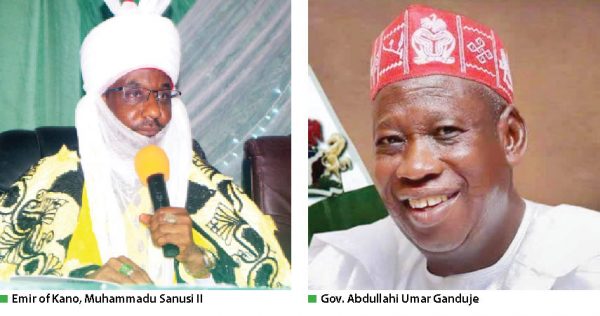By Editor
As the witch hunting of the Emir of Kano, Alhaji Muhammadu Sanusi II, by the government of Kano State continues, the state’s Public Complaints and Anti-Corruption Commission has recommended the suspension of the Emir, from his throne over an alleged misappropriation of N3.4 billion. The commission claimed the crime was committed between 2014 and 2017.
The latest recommendation was contained in a preliminary report of investigation conducted by the commission and signed by its chairman, Mr. Muhuyi Magaji. A copy of the report was made available to newsmen in Kano at the end of Ramadan on Tueaday.
The investigation was in respect of a petition of financial misappropriation levelled against the Kano Emirate Council under Sanusi. The interim report, which raised four cardinal issues bordering on indictments, amount involved, obstruction of investigation and recommendations, indicated that the Kano Emirate Council had spent over N1.4 billion in various ways believed to be fraudulent and un-appropriated.
The Emirate Council was also alleged to have spent over N1.9 billion un-appropriated on seemingly personal matters, contravening the provisions of Section 120 of the 1999 Constitution of the Federal Republic of Nigeria (as amended) and Section 8 of the Kano State Emirate Council Special Fund Law 2004. The expenditures, the report claimed, also allegedly violated Section 314 of the Penal Code as well as the provisions of Section 26 of the Kano State Public Complaints and Anti-Corruption Commission Law 2008 (as amended).
“It is also the opinion of this commission, based on the available evidence, that Emir Muhammadu Sanusi II continued to undermine the investigation through various means, which include giving instruction to all officers invited for clarification to shun the commission’s invitation. The act is seriously affecting the process of our statutory responsibility and offends the provisions of Section 25 of the commission’s enabling law of 2008 (as amended),” the report said.
The panel therefore recommended that the principal suspect in the person of Sanusi and all other suspects connected with the case be suspended, pending the final outcome of the investigations. “This is a necessary administrative disciplinary action aimed at preventing the suspects from further interfering with the commission’s investigations. The commission further recommends that the contract awarded to Tri-C Nigeria Limited for renovation of Babban Daki, Kofar Kudu and Gidan Sarki Dorayi should be revoked as the company belongs to one of the suspects in person of Alhaji Mannir Sanusi, (The Chief of Staff in the Emirate),” it said.
Although we could not get reaction from the Emirate, the spokesman for the Renaissance Coalition Nigeria, Comrade Ibrahim Waiya, cautioned that any attempt to remove the Emir would amount to contempt of court. Waiya said the group was disturbed by the indictment of the Emir when the investigation was yet to be concluded. He urged the government to be fair and just while performing her responsibilities.
In his words, “We wonder how the agency came to the conclusion when investigation was still on. We want the agency to fear God and be just in its dealings. We are aware the agency invited some people for investigation a few days ago. How come the investigation was concluded while those people are yet to appear before the commission? We believe this action can trigger tension and constitute a security threat. We caution Governor Abdullahi Ganduje to be careful in handling the recommendation of the commission because of the security implications,” he cautioned.
Political pundits are of the opinion that Sanusi might have stepped on toes when he openly criticised Ganduje’s plans to borrow $1.85billion from the Chinese Development Bank for light rail project in Kano. Sanusi considered the loan as a misplaced priority for a population whose industrial value may not be able to repay the interest for years. It was learnt that the criticism, which the government considered as an affront to its policies prompted the investigation of the alleged financial recklessness of the emir in April, 2017.





